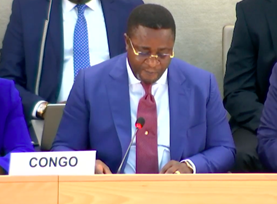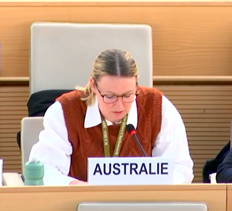45th Session of the Universal Periodic Review
Republic of Congo - 4th Cycle
30th January 2024
By Louise Kazek
Executive Summary:
On the 30th of January, the 45th Session of the Universal Periodic Review (UPR) was held, focusing on the human rights situation in the Republic of Congo for the Fourth Cycle. With the recommendations from Special Rapporteurs and treaty body experts, the progress made and the challenges faced by the Republic of Congo were evaluated by the Human Rights Council.
The delegations advised the implementation of recommendations to the Republic of Congo, highlighting issues such as discrimination against women, torture in prison, human trafficking and rights of education for children. The delegation of the Republic of Congo called attention to the numerous efforts conducted to promote inclusive policies, however the lack of security and weakness of institutions still pose a threat to human rights.
Geneva International Centre for Justice (GICJ) supports the Republic of Congo in its efforts to improve socio-economic rights and urges the end of torture and discrimination against women and prisoners.
Background:
The UPR is a United Nations (UN) mechanism established in 2006 (Res. 60/251) to examine the progress made by countries in compliance with their obligations under international law. UN member states are examined during each cycle, with the current one being the fourth. The Republic of Congo’s report was reviewed in 2009, 2013 and 2018, receiving 267 recommendations during the last review, and supporting 239 of them during its UPR outcome. Most of these recommendations are related to the revision of legal framework, civil and political rights, economic and minorities rights including women and vulnerable groups, priority to education and growth.
The Human Rights Council and civil organisations delivered reports on the remaining issues in the Republic of Congo. Concerns were mentioned about the illegal use of torture, the compliance and ratification of international treaties, the protection of women’s and children rights, as well as human trafficking and the improvement of health services.
Interactive dialogue:
H.E. Mr. Aimé Ange Wilfrid Bininga, Minister of Justice and Human Rights expressed his gratitude to the President of the Human Rights Council and members of the troika for their support in the improvement of the situation in the Republic of Congo.
 The Republic of Congo has been implementing efforts on a national ground to promote and protect human rights – it is inherent to the Congolese Constitution of 2015 to promote a Republic of equality and integrity conformed with international norms and conventions. In the perspective of implementing a new framework of legislation, The Republic of Congo voted for Law number X in 2022 improving human conditions in prison as well as the Code of Penal Procedure that is being officially adopted to tackle human trafficking and torture in prison.
The Republic of Congo has been implementing efforts on a national ground to promote and protect human rights – it is inherent to the Congolese Constitution of 2015 to promote a Republic of equality and integrity conformed with international norms and conventions. In the perspective of implementing a new framework of legislation, The Republic of Congo voted for Law number X in 2022 improving human conditions in prison as well as the Code of Penal Procedure that is being officially adopted to tackle human trafficking and torture in prison.
Concerning women's rights, the Republic of Congo enacted the Mouebara Law, aimed at preventing discrimination and enhancing protection against sexual harassment. Specific sensibilization campaigns have been conducted in the perspective of gender equality. The Republic of Congo ratified international treaties protecting children’s rights, and guarantees education accessibility to all children. The reintegration of young children is facilitated through various programs aligned with the National Plan 2022-2026. These initiatives are geared towards enhancing social, economic, and health outcomes.
The Republic of Congo has conducted significant efforts in maintaining the universal respect of human rights at the core of its Constitution and political organs, with the Commission of Human Rights being fully independent.
Special Rapporteurs have worked closely with the Republic of Congo to enable progress in equality, protection of children’s rights, non-discrimination, economic growth and social rights.
Social measures and signature of treaties
The Republic of Congo ratified recent international treaties and implemented numerous reforms that reinforced the institutional framework and the rule of law regarding the protection of human rights. There have been significant efforts made towards health and social infrastructures. Angola recommends maintaining the efforts regarding public services and healthcare for all. The Republic of Congo followed the previous recommendations and started a transition in terms of security and social rights; Belgium called on the Republic of Congo to sign international treaties assuring security like the International Convention for the Protection of All Persons from Enforced Disappearance and the Second Optional Protocol to the International Covenant on Civil and Political Rights aiming to abolish the death penalty.
Women, children and minorities discrimination
 The representation of women in political organs has increased, with 22% of women in government, 33% in the Constitutional Court, and 40% in the Human Rights Commission. The Republic of Congo initiated programs and councils to foster education and equality. However, there is still a remaining gap with women experiencing gender discrimination as well as suffering from a lack of opportunities, especially in the political sphere. Venezuela encourages the Republic of Congo to maintain its efforts regarding the reduction of infant and maternal mortality. Significant progress has been made in ensuring access to education for all, with Argentina acknowledging these efforts. Additionally, Argentina recommended the possibility of implementing one year of free education for all. Canada called for an effective law combating violence against women and minorities to protect their rights in decision making.
The representation of women in political organs has increased, with 22% of women in government, 33% in the Constitutional Court, and 40% in the Human Rights Commission. The Republic of Congo initiated programs and councils to foster education and equality. However, there is still a remaining gap with women experiencing gender discrimination as well as suffering from a lack of opportunities, especially in the political sphere. Venezuela encourages the Republic of Congo to maintain its efforts regarding the reduction of infant and maternal mortality. Significant progress has been made in ensuring access to education for all, with Argentina acknowledging these efforts. Additionally, Argentina recommended the possibility of implementing one year of free education for all. Canada called for an effective law combating violence against women and minorities to protect their rights in decision making.
Torture and human trafficking
 The Republic of Congo banned any act or form of torture in its law of 2011, while many illegal and violent acts still have been perpetrated. Many judgments about bad treatment, or torture, in prison have been carried out and magistrates trained to implement a better judicial and independent system. The USA recommended initiating more mandates for inquiries against human trafficking and death in prison. Human trafficking has been one of the biggest issues in the Republic of Congo, and Australia strongly incentivized the signature of the Protocol to Prevent, Suppress and Punish Trafficking in Persons, especially since this issue also connects with the discrimination of children and women. The Republic of Congo has been increasing its efforts regarding the implementation of a legal framework for human protection and Brasil insisted on the necessity of a new law on punishing human trafficking to continue the good advances made.
The Republic of Congo banned any act or form of torture in its law of 2011, while many illegal and violent acts still have been perpetrated. Many judgments about bad treatment, or torture, in prison have been carried out and magistrates trained to implement a better judicial and independent system. The USA recommended initiating more mandates for inquiries against human trafficking and death in prison. Human trafficking has been one of the biggest issues in the Republic of Congo, and Australia strongly incentivized the signature of the Protocol to Prevent, Suppress and Punish Trafficking in Persons, especially since this issue also connects with the discrimination of children and women. The Republic of Congo has been increasing its efforts regarding the implementation of a legal framework for human protection and Brasil insisted on the necessity of a new law on punishing human trafficking to continue the good advances made.
Geneva International Centre for Justice calls on the Republic of Congo to intensify its efforts on the protection of all forms of discrimination against women and children, as well as the full elimination of torture and improve the conditions of emprisonment. We also encourage the ratification of international treaties and conventions to assure protection of human rights. We hope that the UPR recommendations will be implemented by the Republic of Congo in due time.








